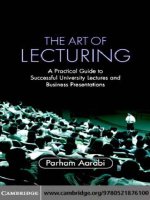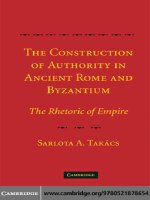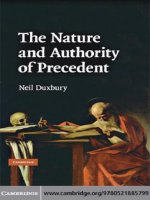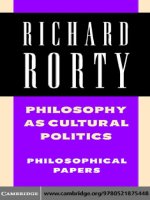0521851874 cambridge university press machiavellis liberal republican legacy nov 2005
Bạn đang xem bản rút gọn của tài liệu. Xem và tải ngay bản đầy đủ của tài liệu tại đây (3.33 MB, 390 trang )
P1: GDZ
0521851874pre
CUNY090-Rahe
0 521 85187 4
September 24, 2005
This page intentionally left blank
ii
17:52
P1: GDZ
0521851874pre
CUNY090-Rahe
0 521 85187 4
September 24, 2005
17:52
Machiavelli’s Liberal Republican Legacy
The significance of Machiavelli’s political thinking for the development
of modern republicanism is a matter of great controversy. In this volume,
a distinguished team of political theorists and historians reassesses the
evidence, examining the character of Machiavelli’s own republicanism and
charting his influence on Marchamont Nedham, James Harrington, John
Locke, Algernon Sidney, John Trenchard, Thomas Gordon, David Hume,
the baron de Montesquieu, Benjamin Franklin, George Washington, John
Adams, Thomas Jefferson, James Madison, and Alexander Hamilton. This
work argues that although Machiavelli himself was not liberal, he did
set the stage for the emergence of liberal republicanism in England. To
the exponents of commercial society, he provided the foundations for a
moderation of commonwealth ideology, and he exercised considerable,
if circumscribed, influence on the statesmen who founded the American
Republic. Machiavelli’s Liberal Republican Legacy will be of great interest
to political theorists, early modern historians, and students of the American
political tradition.
Paul A. Rahe is Jay P. Walker Professor of American History at the
University of Tulsa. His first book, Republics Ancient and Modern: Classical Republicanism and the American Revolution (1992), was an alternative selection of the History Book Club and was reissued in a three-volume
paperback edition in 1994. He coedited Montesquieu’s Science of Politics:
Essays on the Spirit of Laws (2001) and has published chapters in numerous other edited works as well as articles in journals such as The American
Journal of Philology, The American Historical Review, The Review of
Politics, The Journal of the Historical Society, The American Spectator,
and The Wilson Quarterly. He is the recipient of a Rhodes scholarship and
other research fellowships.
i
P1: GDZ
0521851874pre
CUNY090-Rahe
0 521 85187 4
ii
September 24, 2005
17:52
P1: GDZ
0521851874pre
CUNY090-Rahe
0 521 85187 4
September 24, 2005
17:52
Machiavelli’s Liberal Republican Legacy
Edited by
PAUL A. RAHE
University of Tulsa
iii
cambridge university press
Cambridge, New York, Melbourne, Madrid, Cape Town, Singapore, São Paulo
Cambridge University Press
The Edinburgh Building, Cambridge cb2 2ru, UK
Published in the United States of America by Cambridge University Press, New York
www.cambridge.org
Information on this title: www.cambridge.org/9780521851879
© Cambridge University Press 2006
This publication is in copyright. Subject to statutory exception and to the provision of
relevant collective licensing agreements, no reproduction of any part may take place
without the written permission of Cambridge University Press.
First published in print format 2005
isbn-13
isbn-10
978-0-511-13529-3 eBook (EBL)
0-511-13529-7 eBook (EBL)
isbn-13
isbn-10
978-0-521-85187-9 hardback
0-521-85187-4 hardback
Cambridge University Press has no responsibility for the persistence or accuracy of urls
for external or third-party internet websites referred to in this publication, and does not
guarantee that any content on such websites is, or will remain, accurate or appropriate.
P1: GDZ
0521851874pre
CUNY090-Rahe
0 521 85187 4
September 24, 2005
For Harvey C. Mansfield
v
17:52
P1: GDZ
0521851874pre
CUNY090-Rahe
0 521 85187 4
vi
September 24, 2005
17:52
P1: GDZ
0521851874pre
CUNY090-Rahe
0 521 85187 4
September 24, 2005
17:52
Contents
List of Contributors
Acknowledgments
Abbreviations and Brief Titles
Introduction: Machiavelli’s Liberal Republican Legacy
Paul A. Rahe
Prologue: Machiavelli’s Rapacious Republicanism
Markus Fischer
part i: the english commonwealthmen
1 Machiavelli in the English Revolution
Paul A. Rahe
2 The Philosophy of Liberty: Locke’s Machiavellian Teaching
Margaret Michelle Barnes Smith
3 Muted and Manifest English Machiavellism: The
Reconciliation of Machiavellian Republicanism with
Liberalism in Sidney’s Discourses Concerning Government
and Trenchard’s and Gordon’s Cato’s Letters
Vickie B. Sullivan
part ii: the moderate enlightenment
4 Getting Our Bearings: Machiavelli and Hume
John W. Danford
5 The Machiavellian Spirit of Montesquieu’s Liberal Republic
Paul Carrese
6 Benjamin Franklin’s “Machiavellian” Civic Virtue
Steven Forde
page ix
xi
xiii
xix
xxxi
1
9
36
58
87
94
121
143
vii
P1: GDZ
0521851874pre
CUNY090-Rahe
0 521 85187 4
September 24, 2005
viii
part iii: the american founding
7 The American Prince? George Washington’s
Anti-Machiavellian Moment
Matthew Spalding
17:52
Contents
167
170
8 John Adams’s Machiavellian Moment
C. Bradley Thompson
189
9 Thomas Jefferson’s Machiavellian Political Science
Paul A. Rahe
208
10 James Madison’s Princes and Peoples
Gary Rosen
229
11 Was Alexander Hamilton a Machiavellian Statesman?
Karl-Friedrich Walling
254
Index
279
P1: GDZ
0521851874pre
CUNY090-Rahe
0 521 85187 4
September 24, 2005
17:52
Contributors
Paul Carrese is Professor of Political Science at the U.S. Air Force Academy
and Director of its Honors Program. He coedited John Marshall’s The Life of
George Washington: Special Edition for Schools (2001) and is author of The
Cloaking of Power: Montesquieu, Blackstone, and the Rise of Judicial Activism
(2003) and articles on political philosophy, constitutional law, the American
founding, and George Washington.
John W. Danford, Professor of Political Science at Loyola University Chicago,
is author of Wittgenstein and Political Philosophy (1978), David Hume and
the Problem of Reason (1990), and Roots of Freedom (2000, 2004). He has
also published articles and book chapters on Thomas Hobbes, Adam Smith,
and the Scottish Enlightenment.
Markus Fischer, Assistant Professor in the Department of Liberal Studies at
California State University, Fullerton, is author of Well-Ordered License: On
the Unity of Machiavelli’s Thought (2000), “Machiavelli’s Political Psychology” (Review of Politics 1997), and “Machiavelli’s Theory of Foreign Politics”
(Security Studies 1995/96). He has also published on the international relations
of feudal Europe and the role of culture in foreign affairs.
Steven Forde, Professor of Political Science at the University of North Texas,
is author of The Ambition to Rule: Alcibiades and the Politics of Imperialism
in Thucydides (1987). He has also published articles on classical and modern
political thought, international ethics, and the American founding.
Paul A. Rahe, Jay P. Walker Professor of History at the University of Tulsa,
is author of Republics Ancient and Modern: Classical Republicanism and the
American Revolution (1992) and coeditor of Montesquieu’s Science of Politics:
Essays on the Spirit of Laws (2001). He has published numerous articles and
book chapters on the history of self-government.
ix
P1: GDZ
0521851874pre
x
CUNY090-Rahe
0 521 85187 4
September 24, 2005
17:52
List of Contributors
Gary Rosen is the managing editor of Commentary, the author of American
Compact: James Madison and the Problem of Founding (1999), and the editor
the The Right War? The Conservative Debate on Iraq (2005). He holds a Ph.D.
in political science from Harvard University.
Margaret Michelle Barnes Smith, Instructor of Politics at Oglethorpe University,
is a graduate student at Michigan State University. Her contribution to this book
is her first publication.
Matthew Spalding, Director of the B. Kenneth Simon Center for American
Studies at The Heritage Foundation, is coauthor of A Sacred Union of Citizens:
Washington’s Farewell Address and the American Character (1996) and coeditor of Patriot Sage: George Washington and the American Political Tradition
(1999). He writes mostly on American political history and constitutionalism.
Vickie B. Sullivan, Associate Professor of Political Science at Tufts University,
is the author of Machiavelli, Hobbes, and the Formation of a Liberal Republicanism in England (2004) and of Machiavelli’s Three Romes: Religion, Human
Liberty, and Politics Reformed (1996), the editor of The Comedy and Tragedy of
Machiavelli: Essays on the Literary Works (2000), and coeditor of Shakespeare’s
Political Pageant: Essays in Politics and Literature (1996). She has published
articles in American Political Science Review, History of Political Thought,
Political Theory, and Polity.
C. Bradley Thompson, BB&T Research Professor at Clemson University, is
author of the award-winning John Adams and the Spirit of Liberty (1998) and
editor of The Revolutionary Writings of John Adams (2000) and Antislavery
Political Writings, 1833–1860: A Reader (2003).
Karl-Friedrich Walling, Associate Professor of Strategy at the United States
Naval War College, is the author of Republican Empire: Alexander Hamilton on
War and Free Government (1999) and coeditor with Bradford Lee of Strategic
Logic and Political Rationality (2003).
P1: GDZ
0521851874pre
CUNY090-Rahe
0 521 85187 4
September 24, 2005
17:52
Acknowledgments
The project that eventuated in this book began a bit more than ten years ago in
early September 1994, when three of the contributors – the authors of Chapters 8, 9, and 11 – appeared together on a panel at the annual meeting of the
American Political Science Association. The papers they drafted for that gathering were eventually published together under the title “American Faces of
Machiavelli” in The Review of Politics 57:3 (Summer 1995): 389–481, and are
reprinted here in revised form with the permission of that journal’s editor.
Chapter 1 is adapted in part from Paul A. Rahe’s “An Inky Wretch: The
Outrageous Genius of Marchamont Nedham,” National Interest 70 (Winter
2002–3): 55–64. That article is reprinted here in revised form with the permission of that journal’s editor. It is adapted in part from Republics Ancient
and Modern: Classical Republicanism and the American Revolution by Paul A.
Rahe (Chapel Hill, NC: University of North Carolina Press, 1992), and is used
here by permission of the publisher.
Chapter 3 is adapted from Vickie B. Sullivan’s, Machiavelli, Hobbes, and
the Formation of a Liberal Republicanism in England (New York: Cambridge
University Press, 2004), and is used here by permission of the publisher. Parts
of Chapter 10 were first published in American Compact: James Madison and
the Problem of Founding by Gary Rosen (Laurence, KS: University Press of
Kansas, 1999), and are used here with the publisher’s permission.
xi
P1: GDZ
0521851874pre
CUNY090-Rahe
0 521 85187 4
xii
September 24, 2005
17:52
P1: GDZ
0521851874pre
CUNY090-Rahe
0 521 85187 4
September 24, 2005
17:52
Abbreviations and Brief Titles
In the footnotes, we have adopted the standard abbreviations for classical texts
and inscriptions and for books of the Bible provided in The Oxford Classical
Dictionary, 3rd edition revised, ed. Simon Hornblower and Antony Spawforth
(Oxford, UK: Oxford University Press, 2003), and in The Chicago Manual
of Style, 15th edition (Chicago: University of Chicago Press, 2003), 15.50–3.
Where possible, the ancient texts and medieval and modern works of similar
stature are cited by the divisions and subdivisions employed by the author or
introduced by subsequent editors (that is, by book, part, chapter, section number, paragraph, act, scene, line, Stephanus page, or page and line number). In
some cases, where further specification is needed to help the reader to locate
a particular passage, we have included as the last element in a particular citation the page or pages of the pertinent volume of the edition used. Although,
for the convenience of those who do not know Italian, we cite recent English
translations of Machiavelli’s works, we have on occasion altered the translation
in light of the Italian original. For modern works and for journals frequently
cited, the following abbreviations and short titles have been employed:
ABF
AH
AJL
APSR
CJL
CL
The Autobiography of Benjamin Franklin, ed. Leonard
W. Labaree et al. (New Haven, CT: Yale University
Press, 1964).
Alexander Hamilton.
The Adams–Jefferson Letters: The Complete
Correspondence between Thomas Jefferson and Abigail
and John Adams, ed. Lester J. Cappon (Chapel Hill,
NC: University of North Carolina Press, 1959).
The American Political Science Review.
The Correspondence of John Locke, ed. Esmond S. de
Beer (Oxford, UK: Clarendon Press, 1976–89).
John Trenchard and Thomas Gordon, Cato’s Letters:
or, Essays on Liberty, Civil and Religious, and Other
xiii
P1: GDZ
0521851874pre
CUNY090-Rahe
xiv
Descartes, DM
Fed.
GW
GWC
Hobbes, Behemoth
———, Dialogue
———, Elements
———, EW
———, Leviathan
———, Phil. Rud.
HPT
Hume, EHU
———, EMPL
———, EPM
0 521 85187 4
September 24, 2005
17:52
Abbreviations and Brief Titles
Important Subjects, ed. Ronald Hamowy (Indianapolis,
IN: Liberty Classics, 1995).
Ren´e Descartes, Discours de la m´ethode, in Ren´e
Descartes, Oeuvres et lettres, ed. Andr´e Bridoux (Paris:
Biblioth´eque de la Pl´eiade, 1953), 125–79.
Alexander Hamilton, James Madison, and John Jay,
The Federalist, ed. Jacob E. Cooke (Middletown, CT:
Wesleyan University Press, 1961).
George Washington.
George Washington: A Collection, ed. W. B. Allen
(Indianapolis, IN: Liberty Classics, 1988).
Thomas Hobbes, Behemoth, or The Long Parliament,
¨
2nd edition, ed. Ferdinand Tonnies
(New York: Cass,
1969).
Thomas Hobbes, A Dialogue between a Philosopher
and a Student of the Common Laws of England, ed.
Joseph Cropsey (Chicago: University of Chicago Press,
1971).
Thomas Hobbes, The Elements of Law Natural and
¨
Politic, 2nd edition, ed. Ferdinand Tonnies
(London:
Cass, 1969).
The English Works of Thomas Hobbes of Malmesbury,
ed. Sir William Molesworth (London: J. Bohn,
1839–45).
Thomas Hobbes, Leviathan: With Selected Variants
from the Latin Edition of 1688 [1651], ed. Edwin
Curley (Indianapolis, IN: Hackett, 1994).
Thomas Hobbes, Philosophicall Rudiments Concerning
Government and Society, in Hobbes, De Cive: The
English Version, ed. Howard Warrender (Oxford, UK:
Clarendon Press, 1983).
History of Political Thought.
David Hume, An Enquiry Concerning Human
Understanding, in David Hume, Enquiries Concerning
the Human Understanding and Concerning the
Principles of Morals, 3rd edition, ed. L. A. Selby-Bigge
with text revised and notes by P. H. Nidditch (Oxford,
UK: Clarendon Press, 1975), 5–165.
David Hume, Essays Moral, Political, and Literary, ed.
Eugene F. Miller (Indianapolis, IN: Liberty Classics,
1985).
An Enquiry Concerning the Principles of Morals, in
David Hume, Enquiries Concerning the Human
Understanding and Concerning the Principles of
Morals, 3rd edition, ed. L. A. Selby-Bigge with text
P1: GDZ
0521851874pre
CUNY090-Rahe
0 521 85187 4
Abbreviations and Brief Titles
———, HE
———, THN
JA
Jefferson, NSV
JHO
JM
Locke, ECHU
———, LCT
———, STCE
———, TTG
Madison, MF
Montesquieu, EL
———, LP
———, Rom.
Nedham, EFS
NM
September 24, 2005
17:52
xv
revised and notes by P. H. Nidditch (Oxford, UK:
Clarendon Press, 1975), 169–343.
David Hume, The History of England (Indianapolis,
IN: Liberty Classics, 1983).
David Hume, A Treatise of Human Nature,
ed. L. A. Selby-Bigge (Oxford, UK: Clarendon Press,
1888).
John Adams.
Thomas Jefferson, Notes on the State of Virginia, ed.
William Peden (Chapel Hill, NC: University of North
Carolina Press, 1954).
James Harrington’s Oceana, ed. S. B. Liljegren
(Heidelberg: C. Winter, 1924).
James Madison.
John Locke, An Essay Concerning Human
Understanding, ed. Peter H. Nidditch (Oxford, UK:
Clarendon Press, 1979).
John Locke, A Letter Concerning Toleration, ed. James
Tully (Indianapolis, IN: Hackett, 1983).
John Locke, Some Thoughts Concerning Education, ed.
John W. Yolton and Jean S. Yolton (Oxford, UK:
Clarendon Press, 1989).
John Locke, Two Treatises of Government: A Critical
Edition with an Introduction and Apparatus Criticus,
2nd edition, ed. Peter Laslett (Cambridge, UK:
Cambridge University Press, 1970), as corrected by
Nathan Tarcov, Locke’s Education for Liberty
(Chicago: University of Chicago Press, 1984), 229–30
n. 324, 253–4 n. 187.
The Mind of the Founder: Sources of the Political
Thought of James Madison, revised edition, ed. Marvin
Meyers (Hanover, NH: University Press of New
England, 1981).
Charles de Secondat, baron de La Br`ede et de
Montesquieu, De l’esprit des lois, in WoM 2:225–995.
Charles de Secondat, baron de La Br`ede et de
Montesquieu, Lettres persanes, in WoM 1:129–373.
Charles de Secondat, baron de La Br`ede et de
Montesquieu, Consid´erations sur les causes de la
grandeur des Romains et de leur d´ecadence, in
WoM 2:69–209.
Marchamont Nedham, The Excellencie of a Free State
(1656), ed. Richard Baron (London: A. Millar
and T. Cadell, 1767).
Niccolo` Machiavelli.
P1: GDZ
0521851874pre
CUNY090-Rahe
xvi
———, AW
———, D
———, FH
———, O
———, P
PAH
PBF
PGM
PJA
PJAM
PJM
PTJ
PWoJH
RFC
RP
Sidney, CM
———, DCG
TJ
WMQ
0 521 85187 4
September 24, 2005
17:52
Abbreviations and Brief Titles
Niccolo` Machiavelli, Art of War, ed. and tr. Christopher
Lynch (Chicago: University of Chicago Press, 2003).
Niccolo` Machiavelli, Discourses on Livy, ed. and tr.
Harvey C. Mansfield and Nathan Tarcov (Chicago:
University of Chicago Press, 1996).
Niccolo` Machiavelli, Florentine Histories, ed. and tr.
Laura F. Banfield and Harvey C. Mansfield (Princeton,
NJ: Princeton University Press, 1988).
Niccolo` Machiavelli, Tutte le opere, ed. Mario Martelli
(Florence: G. C. Sansoni, 1971).
Niccolo` Machiavelli, The Prince, tr. Harvey C.
Mansfield (Chicago: University of Chicago Press, 1985).
The Papers of Alexander Hamilton, ed. Harold C. Syrett
(New York: Columbia University Press, 1961–79).
The Papers of Benjamin Franklin, ed. Leonard W.
Labaree et al. (New Haven, CT: Yale University Press,
1959–2003).
The Papers of George Mason, ed. Robert A. Rutland
(Chapel Hill, NC: University of North Carolina Press,
1970).
Papers of John Adams, ed. Robert J. Taylor (Cambridge,
MA: Harvard University Press, 1977–2000).
Papers of John Adams, Microfilm, Massachusetts
Historical Society.
The Papers of James Madison, ed. William T.
Hutchinson, William M. E. Rachal, et al. (Chicago:
University of Chicago Press, 1962–77; Charlottesville,
VA: University Press of Virginia, 1977–).
The Papers of Thomas Jefferson, ed. Julian P. Boyd
(Princeton, NJ: Princeton University Press, 1950–).
The Political Works of James Harrington, ed. J. G. A.
Pocock (Cambridge, UK: Cambridge University Press,
1977).
The Records of the Federal Convention of 1787, ed.
Max Farrand (New Haven, CT: Yale University Press,
1911–37).
Review of Politics.
Algernon Sidney, Court Maxims, ed. Hans W. Blom,
Eco Haitsma Mulier, and Ronald Janse (Cambridge,
UK: Cambridge University Press, 1996).
Algernon Sidney, Discourses Concerning Government,
ed. Thomas G. West (Indianapolis, IN: Liberty Classics,
1990).
Thomas Jefferson.
William and Mary Quarterly, 3rd series.
P1: GDZ
0521851874pre
CUNY090-Rahe
0 521 85187 4
Abbreviations and Brief Titles
WoFB
September 24, 2005
17:52
xvii
The Works of Francis Bacon, ed. James Spedding,
Robert Leslie Ellis, and Douglas Denon Heath (London:
Longman, 1857–74).
WoJA
The Works of John Adams, ed. Charles Francis Adams
(Boston: Little, Brown, 1850–6).
WoJH
James Harrington, Works: The Oceana and Other
Works of James Harrington, ed. John Toland (London:
T. Becket, T. Cadell, and T. Evans, 1771).
WoJL
The Works of John Locke (London: T. Tegg, 1823).
WoLB
The Works of Lord Bolingbroke, with a Life Prepared
Expressly for this Edition, Containing Information
Relative to His Personal and Public Character
(Philadelphia, PA: Carey and Hart, 1841).
WoM
Charles de Secondat, baron de La Br`ede et de
Montesquieu, Oeuvres compl`etes de Montesquieu,
ed. Roger Caillois (Paris: Biblioth`eque de la Pl´eiade,
1949–51).
WoTJ
The Works of Thomas Jefferson, ed. Paul Leicester Ford
(New York: G. P. Putnam’s Sons, 1904–5).
WrBF
Benjamin Franklin, Writings, ed. J. A. Leo Lemacy
(New York: Library of America, 1987).
WrGW
The Writings of George Washington, ed. John C.
Fitzpatrick (Washington, DC: United States
Government Printing Office, 1931–44).
WrTJ (ed. Ford)
The Writings of Thomas Jefferson, ed. Paul Leicester
Ford (New York: G. P. Putnam’s Sons, 1892–9).
WrTJ (ed. Lipscomb The Writings of Thomas Jefferson, ed. Andrew A.
and Bergh)
Lipscomb and Albert Ellery Bergh (Washington, DC:
Thomas Jefferson Memorial Association, 1903).
WrTJ (ed. Peterson) Thomas Jefferson, Writings, ed. Merrill D. Peterson
(New York: Library of America, 1984).
WrTJ
The Writings of Thomas Jefferson, ed. H. A.
(ed. Washington) Washington (New York: Taylor & Maury, 1853–5).
P1: GDZ
0521851874pre
CUNY090-Rahe
0 521 85187 4
xviii
September 24, 2005
17:52
P1: GDZ
0521851874pre
CUNY090-Rahe
0 521 85187 4
September 24, 2005
17:52
Introduction
Machiavelli’s Liberal Republican Legacy
Paul A. Rahe
The contributors to this volume are debtors. They work in a field that others
opened up, cleared, and to a certain extent tilled before most of them even
came on the scholarly scene. Their creditors in this particular regard are, as one
would expect, numerous – but five of these stand out.
The first is a scholar named Zera Fink. Some sixty years ago, in 1945, as
the Second World War came to an end, he published a slender volume entitled
The Classical Republicans: An Essay in the Recovery of a Pattern of Thought
in Seventeenth-Century England, which he characterized as “a chapter in the
history of ideas.”1 Fink’s book was a pioneering work aimed at establishing the
Machiavellian character of much of the thinking inspired by England’s abortive
republican experiment and at clarifying its overall significance.
Fourteen years after the appearance of Fink’s work, Caroline Robbins
brought out The Eighteenth-Century Commonwealthman: Studies in the Transmission, Development and Circumstance of English Liberal Thought from the
Restoration of Charles II until the War with the Thirteen Colonies, a no less
seminal book that took up the story of English radicalism at almost precisely
the point where Fink left off.2 Eight years later, Bernard Bailyn presented to
the world The Ideological Origins of the American Revolution, a work of
comparable significance, which traced the influence on the American colonists
of the 1760s and 1770s of the thinking of Fink’s seventeenth-century classical republicans and Robbins’s eighteenth-century commonwealthmen.3 Then,
1
2
3
See Zera S. Fink, The Classical Republicans: An Essay in the Recovery of a Pattern of Thought in
Seventeenth-Century England, 2nd edition (Evanston, IL: Northwestern University Press, 1962),
vii. I cite the preface to the first edition, which was published in 1945.
See Caroline Robbins, The Eighteenth-Century Commonwealthman: Studies in the Transmission, Development and Circumstance of English Liberal Thought from the Restoration of
Charles II until the War with the Thirteen Colonies (Cambridge, MA: Harvard University Press,
1959).
See Bernard Bailyn, The Ideological Origins of the American Revolution (Cambridge, MA:
Harvard University Press, 1967).
xix
P1: GDZ
0521851874pre
xx
CUNY090-Rahe
0 521 85187 4
September 24, 2005
17:52
Paul A. Rahe
two years later, Gordon Wood brought out The Creation of the American
Republic, 1776–1787, which explored the manner in which the tradition of
thinking investigated by Fink, Robbins, and Bailyn influenced those who framed
governments for the various states within the new American union in the years
following the Declaration of Independence as well as those who framed the
federal constitution in the summer of 1787.4
Finally, in 1974, J. G. A. Pocock published The Machiavellian Moment:
Florentine Political Thought and the Atlantic Republican Tradition.5 Drawing on the work of Fink, Robbins, Bailyn, Wood, and others, Pocock articulated a grand synthesis suggesting an essential continuity in republican thought,
stretching from Aristotle to Machiavelli, from Machiavelli to James Harrington, and from Harrington to Thomas Jefferson.
Pocock’s work was greeted with great applause – in part because it confirmed and strengthened a fashion then already gaining sway among historians
and political scientists, who were increasingly inclined to contrast the publicspirited “republicanism” of America’s founders with the tawdry “liberalism”
of their successors.6 The book’s authority was great and its influence immense.
Within the scholarly world, however, many believed that the author of The
Machiavellian Moment was inclined on occasion to lump where he should
have split, and a considerable literature emerged challenging his argument in
one or another particular. In 1992, the editor of this volume published a weighty
tome – entitled Republics Ancient and Modern: Classical Republicanism and
the American Revolution – arguing that Pocock had it almost entirely wrong:
that the republicanism of the American founders was in most regards a liberal
republicanism and that they were the heirs of a series of revolutions in political thought that set Machiavelli at odds with Aristotle and classical republicanism, Harrington at odds with Machiavelli, and Jefferson at odds with
Harrington.7
If, however, it no longer seems obvious that “liberalism” and the species of
“republicanism” embraced by the English republicans, their radical Whig successors, and the American founders are as such incompatible, it is by no means
4
5
6
7
See Gordon S. Wood, The Creation of the American Republic, 1776–1787 (Chapel Hill, NC:
University of North Carolina Press, 1969).
See J. G. A. Pocock, The Machiavellian Moment: Florentine Political Thought and the Atlantic
Republican Tradition (Princeton, NJ: Princeton University Press, 1974).
See, for example, Robert E. Shalhope, “Toward a Republican Synthesis: The Emergence of an
Understanding of Republicanism in American Historiography,” WMQ 29:1 (January 1972):
49–80. See also Shalhope, “Republicanism and Early American Historiography,” WMQ 39:2
(April 1982): 334–56. Pocock’s earlier work, in anticipating the themes of his Machiavellian
Moment, had done much to inspire this fashion: See J. G. A. Pocock, “Machiavelli, Harrington,
and English Political Ideologies,” WMQ 22:4 (October 1965): 549–83. See also J. G. A. Pocock,
“Civic Humanism and Its Role in Anglo-American Thought,” in Pocock, Politics, Language, and
Time: Essays on Political Thought and History (New York: Atheneum, 1971), 80–103.
See Paul A. Rahe, Republics Ancient and Modern: Classical Republicanism and the American
Revolution (Chapel Hill, NC: University of North Carolina Press, 1992), which cites much, if
not quite all, of the prior secondary literature in favor of and against the Pocockian synthesis.
P1: GDZ
0521851874pre
CUNY090-Rahe
0 521 85187 4
Introduction
September 24, 2005
17:52
xxi
clear what it was, if anything, that Machiavelli contributed to the development
of self-government in modern times. The essays in this volume constitute a series
of discrete but closely interrelated attempts to throw light on this matter. They
examine with care the argument presented by Machiavelli in his Discourses on
Livy, and they explore the manner in which the most important of the figures
discussed by Fink, Robbins, Bailyn, Wood, and Pocock came to grips with,
developed, and adapted the Florentine’s argument.
The contributors to this book have much in common. They agree with
Pocock that Machiavelli’s influence was considerable – that many of the English
republicans of the seventeenth century, the English commonwealthmen of the
eighteenth century, and the leading figures of the Enlightenment in France and
Scotland, as well as some of the American revolutionaries, learned a great deal
from reading the Discourses on Livy or the works of those who restated its
argument in whole or in part. They are united as well in regarding Pocock’s
depiction of Machiavelli’s understanding of republicanism as highly misleading,
and they are persuaded that Marchamont Nedham, James Harrington, John
Locke, Algernon Sidney, John Trenchard, Thomas Gordon, David Hume, the
baron de Montesquieu, George Washington, Benjamin Franklin, John Adams,
Thomas Jefferson, James Madison, and Alexander Hamilton – all of whom
Machiavelli influenced in one fashion or another – should be read not as semiconscious speakers of a common political “language” unable to say or think
what cannot be expressed in their inherited tongue but as fully conscious agents:
liberated from intellectual servitude by their familiarity with a variety of ways
of thinking about politics, inclined to judge what they read in light of their own
considerable experience in the larger world, and wholly capable of thinking for
themselves and of fashioning language with which to express their convictions,
however unorthodox. One consequence is that the contributors to this book
are convinced that Machiavelli’s republican legacy is, while vital for understanding the origins of modern liberal democracy, nonetheless quite complex
and diverse. Their goal has been to do justice to that complexity and diversity
while pointing, at the same time, to common threads. As will become clear, in
receiving Machiavelli, the English commonwealthmen, their successors in the
moderate Enlightenment, and the American founders adapted his teaching to
their own needs, rejected it in part, and on occasion followed through on its
underlying logic in a fashion that Machiavelli chose not to do.
Machiavelli’s Modern Populism
In the prologue, Markus Fischer sets the stage. He begins by examining the civic
humanist context within which Machiavelli composed his Discourses on Livy –
outlining the character of the republicanism found in ancient Greece and Rome;
touching on its analysis in the works of Aristotle, Cicero, Polybius, Livy, and
Sallust; tracing the revival of civic aspirations in the late Middle Ages and among
the humanists of the Renaissance; and demonstrating that Machiavelli, in full
consciousness, repudiated his classical republican and civic humanist heritage.
P1: GDZ
0521851874pre
CUNY090-Rahe
0 521 85187 4
xxii
September 24, 2005
17:52
Paul A. Rahe
In its stead, as Professor Fischer shows in detail, Machiavelli advocates a new
species of republicanism, liberated from the moral restraints promoted by the
ancients and their scholastic and humanist admirers. The tradition of natural
law the Florentine pointedly ignores; justice he treats as purely instrumental.
The notion that an education in moral virtue can be relied on he debunks; and,
in its place, he promotes institutions bolstered by a peculiar mixture of savagery,
` Where the ancients thought concord
ambition, and dread, which he calls virtu.
the bulwark of a republic, Machiavelli favors tumults, seeing them as conducive
not only to the defense of liberty but also to the acquisition of empire. That
private interests will be pursued in and socioeconomic conflicts will impinge on
the public arena he regards as both inevitable and good.
The management of affairs Machiavelli leaves to those whom he terms
“princes.” To found a republic, fashion its institutions, and make use of superstition to instill in the people that love of the fatherland and devotion to its
defense and expansion that constitutes popular virtu` takes the cunning and
ruthlessness of a “new prince,” endowed with a species of ambition and a virtuosity that the people can never attain. Moreover, in the absence of leaders
constrained to some degree by tumults, inspired by a love of glory, and endowed
` such a republic cannot be sustained, for it requires frequent
with princely virtu,
refounding through exemplary punishments and deeds aimed at restoring the
` Spirited execution is a sine qua
sense of dread that underpins popular virtu.
non that takes precedence over justice itself.
Such a polity is distinguished from tyranny by the fact that it serves what
Machiavelli calls “the common good.” In using this term, the Florentine has in
mind war, conquest, and empire aimed at satisfying at the expense of outsiders
the ambition of the citizens and their longing for glory, power, and wealth. His
republicanism inflames appetite; it sanctions and encourages licentiousness; and
then, by means of laws and practices, especially those which institutionalize class
conflict, it orders and channels appetite in such a way as to sustain liberty and
promote expansion. In the end, Machiavelli’s rapacious republic is held together
by fear and by greed. A republic bereft of threatening enemies and of occasions
for the exploitation of outsiders cannot, he believes, be maintained. When it
exhausts both by conquering the world, as Rome did in time, it is doomed.
The English Commonwealthmen
Given the rapacious character of Machiavelli’s republicanism and its repudiation of moral virtue, I argue in the preface to the book’s first part that it is by no
means strange that his republicanism encountered resistance – especially since
circumstances in the sixteenth century were unfriendly to republics. It took an
extraordinary event to make men receptive to the Florentine’s blandishments,
and the execution of Charles I on 30 January 1649 and the subsequent establishment of the English republic constituted just such an event, opening the way
for a widespread consideration of what practical men intent on the preservation of liberty and the well-being of a commonwealth could learn of use from
P1: GDZ
0521851874pre
CUNY090-Rahe
Introduction
0 521 85187 4
September 24, 2005
17:52
xxiii
studying the Discourses on Livy. This event marked the first stage in the reception of Machiavelli’s republican teaching, its adaptation and partial reorientation in light of persistent English concerns, which is the subject of the first three
chapters in this book.
As I seek to make clear in this book’s initial chapter, the first to distill the
fruits of such study was the journalist Marchamont Nedham, who adapted
Machiavelli’s teaching to English tastes for English use and propagated a species
of Machiavellian republicanism initially in the pages of the weekly gazette
Mercurius Politicus in the period stretching from September 1651 to August
1652 and then in a book entitled The Excellencie of a Free State, which he
published late in the spring of 1656. James Harrington followed suit with his
Commonwealth of Oceana late that fall. Nedham emphasized Machiavelli’s
populism, praising with some reservations his defense of tumults and insisting,
above all else, on the need for frequent elections, while Harrington sought to
eliminate class conflict and tumults by designing institutions capable of sustaining themselves without princely and popular virtu` as an auxiliary support. In
the process of restating and refining Machiavelli’s republicanism, both sought
to tone it down and draw out the logic of the Florentine’s populism in such a
way as to subordinate honor and glory to the more prosaic concern with the
protection of personal rights and property that animated the majority of those
within the political nation.
Nedham and Harrington may have been the first Englishmen to exploit
the tension in Machiavelli’s republicanism between his aristocratic taste for
grandeur and the populism he espouses. They were by no means the last. As
Margaret Michelle Barnes Smith suggests in the second chapter of this book,
John Locke followed much the same path, using Machiavelli’s debunking of
aristocratic virtue against Machiavelli’s endorsement of glory to forge an understanding of liberty subordinated to the protection of personal rights and property. In their writings, Nedham and Harrington addressed, first and foremost,
the small band of committed republicans who had favored England’s republican
experiment. Locke’s intended audience was much larger and more diverse. In
consequence, where these republicans acknowledged, at least in part, the debt
they owed Machiavelli and Thomas Hobbes, Locke presented himself as a disciple of the venerable Anglican divine Richard Hooker and mentioned neither
the Monster of Malmesbury nor the Florentine said to have given to the devil
his moniker “Old Nick.”8
That Locke read Machiavelli with great care seems, despite his reticence,
quite clear. As Smith notes, he was an avid collector of the Florentine’s writings, and he uses as the epigraph to his Two Treatises of Government a passage
from Livy that Machiavelli repeatedly, in crucial passages, quotes. Both are,
she contends, committed to a project aimed at liberating human beings from a
tyranny grounded in what Hobbes called Aristotelity. They share a loathing of
8
See Samuel Butler, Hudibras, ed. John Wilders (Oxford, UK: Clarendon Press, 1967), 3.1.1313–
16.









